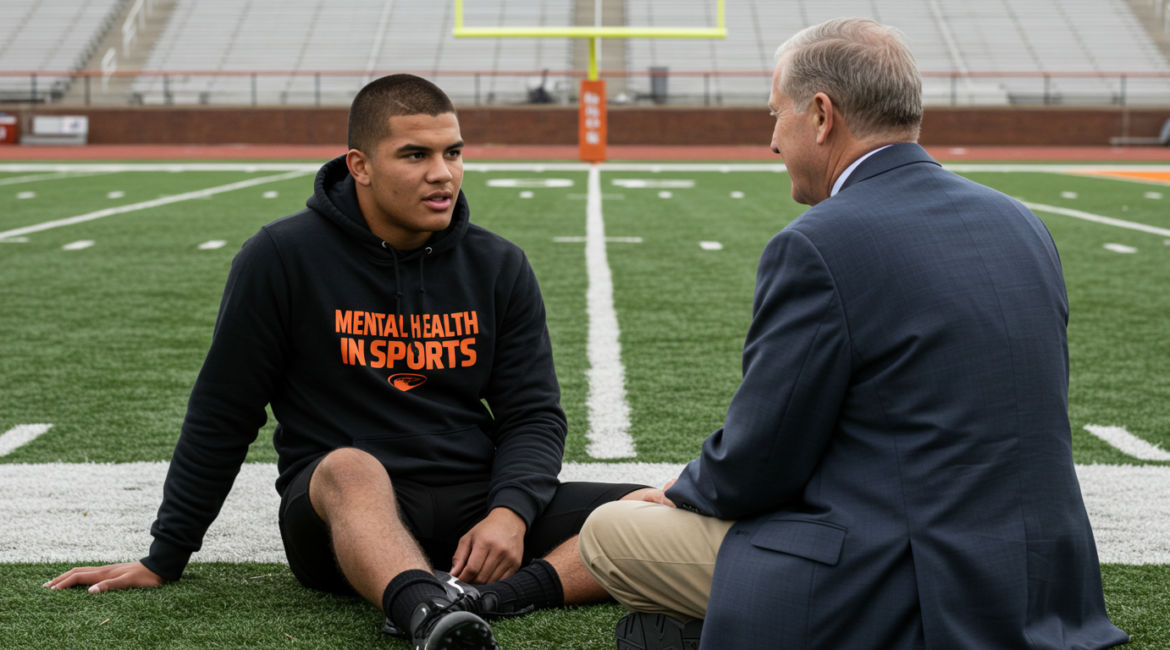The crash of helmets, the roar of the crowd, the weight of expectations – football has always been as much a mental game as a physical one. Yet, for decades, we’ve focused primarily on building stronger bodies while sometimes overlooking the minds that drive them. At RepMax, we’re changing that narrative, one athlete at a time.
Breaking the Silence
During a recent session at one of our partner facilities, I watched a senior quarterback openly discussing pre-game anxiety with his teammates. Five years ago, this scene would have been rare. Today, it’s part of RepMax’s culture of normalized mental health discussions.
“Athletes are finally realizing that mental wellness isn’t a sign of weakness – it’s a crucial component of peak performance,” explains C. Johnson, veteran trainer and former D1 athlete. “When we help players understand this, we see remarkable transformations both on and off the field.”
Beyond ‘Mental Toughness’
 The old school approach of “just tough it out” is being replaced by something more nuanced and effective. RepMax’s mental wellness program includes:
The old school approach of “just tough it out” is being replaced by something more nuanced and effective. RepMax’s mental wellness program includes:
The “Mindful Minutes” protocol, where athletes learn quick, practical techniques for managing game-day stress. These aren’t just breathing exercises – they’re scientifically-backed strategies that help players perform under pressure.
Weekly group sessions where teammates share experiences and coping strategies. The power of peer support can’t be overstated – especially in a sport where vulnerability has traditionally been viewed as weakness.
Individual counseling opportunities with sports psychologists who understand both the game and the unique pressures faced by today’s athletes.
The Performance Connection
The impact of mental wellness on performance is undeniable. Our data shows that players who actively engage in mental health practices show:
- 30% reduction in performance anxiety
- 25% improvement in focus during crucial game moments
- 40% better recovery from setbacks and losses
Beyond the Game
“What makes our approach unique is that we’re not just focused on game-day performance,” says A. Velasco, a former athlete turned RepMax mental wellness advocate. “We’re building life skills that serve these young athletes well beyond their playing days.”
This holistic approach is particularly crucial in an era where student-athletes face unprecedented pressures. Social media scrutiny, academic demands, and athletic expectations create a perfect storm of stressors that require robust mental health strategies.
The Ripple Effect
Perhaps most encouraging is how this approach is spreading beyond individual athletes. Coaches partnering with RepMax report more open communication with their teams, better conflict resolution, and improved team cohesion.
Looking Forward
The future of football isn’t just about faster plays or stronger players – it’s about building mentally resilient athletes who can handle the pressures of both sports and life. RepMax’s commitment to mental wellness isn’t just changing how we approach training; it’s changing lives.
“When we prioritize mental health, we’re not just building better athletes,” Johnson emphasizes. “We’re building better people who happen to be exceptional athletes.”
The Bottom Line
As we continue to evolve our understanding of athletic performance, one thing becomes increasingly clear: mental wellness isn’t just another box to check in athletic development – it’s the foundation upon which lasting success is built.
